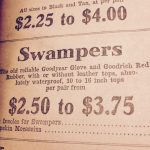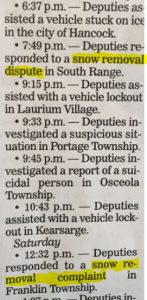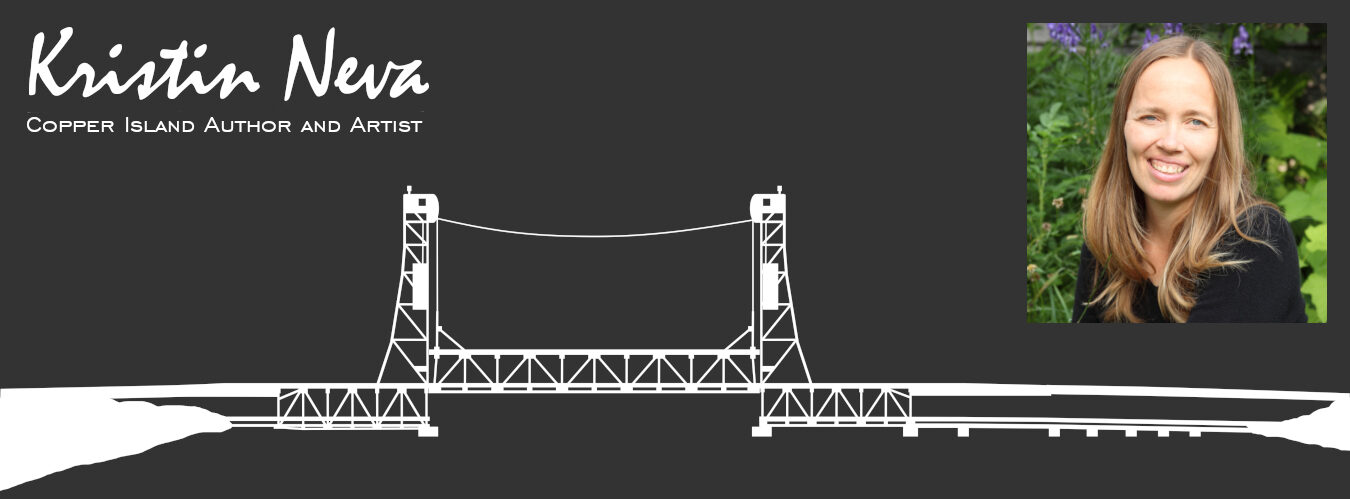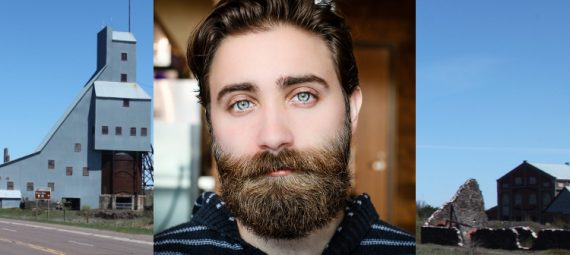“Hyvää päivää.”
“Where you live?”
“Out Mohawk way.”
“Yous get lots of snow dere, hey.”
“Yeah, we woke to two feet today. I scooped myself out then drove Hough’on, but dey hardly got none.”
![]()
I didn’t think I had an accent until I moved to Milwaukee, where I was teased relentlessly by one of my coworkers for dropping my mid-word T‘s. “I drove from Hough’on to Brockway Moun’ain. I didn’t have gloves, so I wore mi’ens.”
I corrected much of my speech over the years, but after I moved back here, seventeen years later, I find myself lapsing back into the sing-songy dialect sprinkled with unique words. “I ate makkara for breakfast, then put on my chook and swampers, strapped on my snow shoes, and went for a walk in the bush. It’s a good way to relieve stress when I’ve been in a hätä.”
Some of these words are Finnish, but not all.
Yoopers take their language seriously. One reader of Snow Country was indignant that I suggested the word chook was not Finnish. “How did you do your research? Are you sure chook isn’t Finnish?” My Finnish-speaking mother assures me it is not. The Yooper word for a knitted stocking cap is most likely from the word toque, from the French-Canadian influence on the area.

My husband had a debate with someone as to what constitutes a proper swamper — is it a rubber-soled boot with a leather upper or any rubber boot?
Makkara is the Finnish word for sausage, but is generally used specifically for summer sausage. Hätä is a dialectal, old-fashioned word for hurried, in a rush, but is used in modern Finn to mean distress. As the language evolved in Finland, Finnish Americans, now in the third and fourth generation, have maintained the old-world dialect. Imagine visiting some far-flung island where the inhabitants speak Shakespearean English. Some Finns have visited Copper Island to study how their language has changed.
Weather is a frequent topic of conversation on the Keweenaw, given the lake-effect snow and different altitudes. When meeting a fellow local, they might ask if you get much snow where you live. It can vary within a few miles, or even from one side of a field to the other.

Yoopers also take their snow removal seriously, whether they pank it, shovel it, scoop it, blow it, or plow it. Of course, if there’s only a little bit of snow, they will simply pank it — pat it down with the back of a grain shovel. More snow might require a Yooper Scooper, a large, galvanized metal shovel that slides on the ground. Others use snow blowers and plow trucks. There’s an occasional police dispatch report in the paper of officers called to such and such a street over a dispute on snow removal techniques. I recall once seeing three such dispatch reports in a row.
People usually explain where they live in reference to small towns, and usually with the phrase “out someplace way.” “I live out Traprock way.” I pointed this out to someone, and she asked, “How else would you say it?” The rest of the country would say I live near someplace, or toward someplace, or in the someplace area.
And when telling somebody where you’re going, you would say that you are going Houghton, or going Green Bay, leaving out the preposition to. This may come from the Finnish influence, because in the Finnish language the preposition of sorts is tacked onto the end of words. “Go to town” is “Mennä kaupunkiin.” “Come from town” is “Kotoisin kaupungista.” The word town, kaupunki, changes — but there is no preposition per se.
The word hey is often used at the end of a sentence to elicit an affirmative response. It’s kind of like saying, “Do you agree?” There’s a bit of a debate on whether Yoopers say hey or eh, many insisting that they say eh but if you listen carefully there’s a slight H at the beginning of it. From my observation, younger people tend to say hey while a few older people say eh, similar to the stereotypical Canadian.
But don’t let the non-standard grammar fool you. Yoopers are often well-educated, intelligent people. We have private-school quality education in our public schools, and there’s a great university and private college here. We embrace our unique dialect and culture.





How about — “We go town side by each, hey”. I would translate that either to a question or that they rode together in the car and then walked or shopped together in town. My great grandfather was a Copper Miner of Cornish decent and I was born in Hancock, Mi. and raised in the Houghton / Hancock area so I grew up hearing the words the author, Kristin Neva, uses in her awesome book called SN❄W COUNTRY.